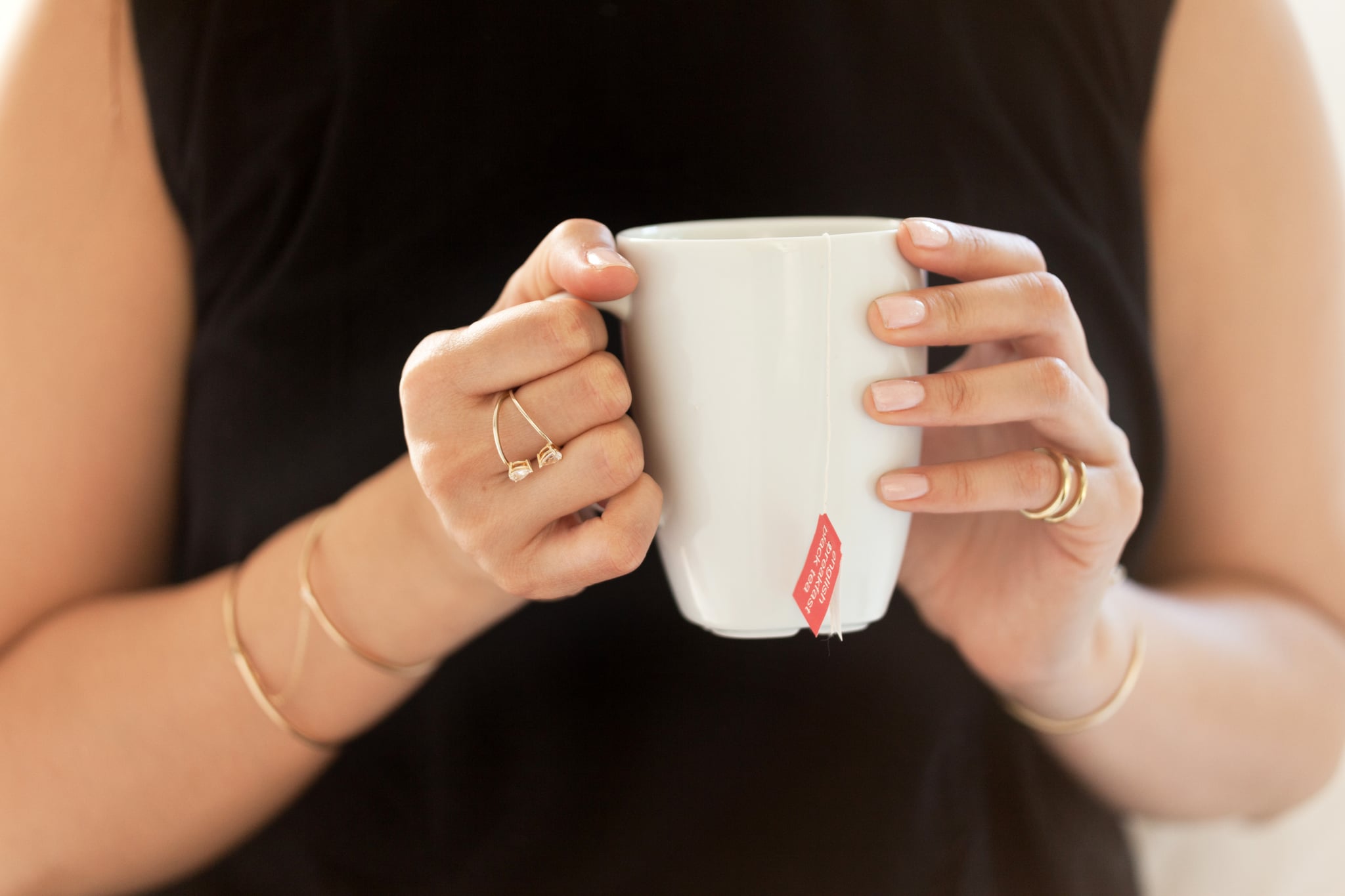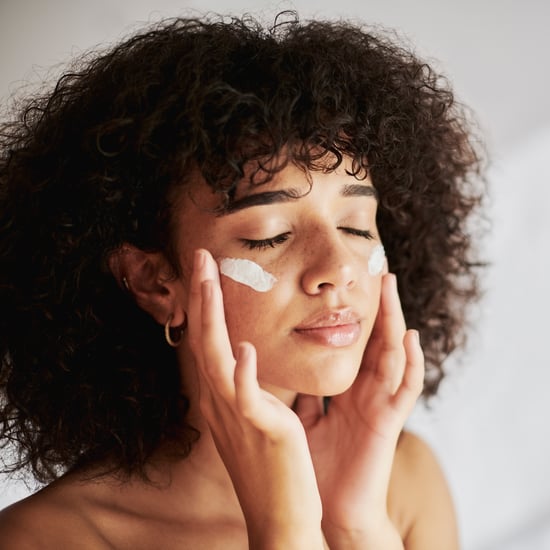Best Teas For Anxiety
Brew Your Way to Calm: These Are All the Best Teas For Anxiety

"Anxiety can have many different causes, and there are many different physiological patterns behind feeling and experiencing anxiety," said Dr. Amy Chadwick, ND at Four Moons Spa, a new modern space for healing and wellness in San Diego, CA. While she doesn't recommend tea as a cure-all or replacement for your remedy, you can absolutely supplement your antianxiety routine with a great cup of calming tea and reap all the natural benefits. "For general calming and/or grounding of the overall energy, these are some of my favourite teas," she shared.
"Teas made from the roots of plants are often more grounding in their energetic properties," she said. Think ginger, licorice root, and turmeric, which "have calming properties to the nervous system without being overly sedating."
Dr. Chadwick shared the ingredients and blends to look for, as well as more sedating teas (at the end of the list) that'll have much stronger effects. Choose the blend that works for you and get the hot water going, because you're about to feel seriously chilled out.
Chamomile (Matricaria chamomilla)
We know it helps with getting some zzz's, but did you know it can help with anxiety, too? "Chamomile helps calm excessive sympathetic nervous system activity and also supports digestion," said Dr. Chadwick.
Passionflower (Passiflora incarnata)
Reduce your stress hormone with the help of this floral wonder that, like chamomile, "helps calm excessive sympathetic nervous system activity," but also reduces "excess cortisol activity." You'll feel a little more chill with passionflower because "it's antispasmodic to the muscles, nerves, and digestive tract and mildly sedating without causing excessive sleepiness or reducing the ability to perform daily activities."
You can sip this before bed, too. "Despite not necessarily causing drowsiness, it does improve sleep quality by calming the nervous system and cortisol activity. It also supports GABA, a calming neurotransmitter."
Tulsi or Holy Basil (Ocimum sanctum)
You may have heard of the adaptogen holy basil. It can help quell your anxious feelings. "It improves the body's ability to manage stress in a resilient and balanced way," said Dr. Chadwick. "This can therefore help alleviate anxiety." Like passionflower, it can also help manage your stress hormone, cortisol. "Holy basil helps the body have a balanced and appropriate cortisol and adrenal response to stress that is appropriate to the demand."
Lemon Balm (Melissa officinalis)
Another helpful adaptogen is lemon balm, which, according to Dr. Chadwick, does wonders for the nervous system and the thyroid. It's another antispasmodic and "supports GABA activity in the brain and calms the nervous system while enhancing attention and memory." Additionally, "it can also help support healthy digestive function and healing," she said.
Big exam on the horizon? Knock out your anxiety before a big presentation or test with lemon balm tea. "Melissa [lemon balm] can be very useful for test anxiety. Drinking the tea during the last few days of studying for the exam and then one cup before the exam can help with both learning and reducing the anxiety of taking the exam."
Turmeric, Ginger, and Licorice
This specific combo works for digestion, but can also help reduce the sensation of panic. "As a combination, these herbs are grounding and rooting to the energy," said Dr. Chadwick. Feeling like your brain is all over the place? Try a gingered golden milk. "These can be very useful in the Autumn when many people's energy becomes more scattered."
Rose
It smells and tastes wonderful, plus helps with anxiety. "Rose is a beautiful addition to some of the herbs above," she said. "It is energetically soothing to the heart and calming to the mind while also being rich in vitamin C and antioxidants."
Lavender (Lavendula angustifola)
Here's an unsurprising addition to the list: soothing lavender. "Lavender is relaxing harmonises opposites," said Dr. Chadwick. "It can be both cooling with some warming potential energetically; it is relaxing while also allowing the mind to be sharp and clear, and it reduces excess sympathetic nervous system activity and is antispasmodic for the nervous system and muscles." And to boot, it'll help you sleep because "it supports GABA activity within the brain and body."
Fennel (Feoniculum vulgare)
Like turmeric and ginger, fennel is excellent for digestion in addition to anxiety relief. "Fennel seed can be made into a tea by itself or added to some of the other herbs above," said Dr. Chadwick. "It can help modulate dopamine activity in some people, improving overall fluidity in adaptation and reducing anxiety."
Licorice Root (Glycerrhiza glabra)
Try combining licorice with holy basil, chamomile, or fennel to intensify their positive effects. "Licorice in larger amounts helps prolong cortisol activity when we have an insufficient adrenal gland response to the need to adapt to a stressor." A precaution, though: "Licorice may raise blood pressure in some people so should be used with caution in anyone with hypertension."
More Sedating Teas:
"Some herbs are more sedating than the ones above and may be used in small amounts for sleep or evening relaxation," said Dr. Chadwick. She suggested skullcap, kava, and valerian root "for more severe anxiety, but their sedating effects should be noted." She advised that "these herbs should also not be used in high quantities for long periods of time without the supervision of your doctor."
These are superpowerful herbs, so you shouldn't rely on them as a constant crutch. "If someone is experiencing severe anxiety and needing to use these herbs on a regular basis, work with your doctor on the underlying reasons for the anxiety," said Dr. Chadwick. Let's look at each of these teas.
Skullcap (Scutellaria lateriflora)
The mildest of the bunch: "Skullcap is relaxing to the nervous system, is an antispasmodic, moderate sedative, and may support GABA activity. It is useful for anxiety and nervous tension, stress, and insomnia. It may be blended with passionflower and lavender or lemon balm and lavender for an evening tea. It can be used during the daytime, but may cause mild sedation."
Kava (Piper methisticum)
"Kava is sedating and may directly affect GABA receptors, but this has not been clearly shown in the research," she said. "It may have a stronger effect on the sympathetic nervous system and noradrenaline activity within the brain." Additionally, kava tea can be a painkiller because it has "analgesic effects, making it useful for pain, and it does help reduce anxiety. It is also a muscle relaxant. Kava should be used in moderation and not for prolonged periods of time or if you have a history of kidney or liver disease."
Valerian (Valeriana officinalis)
Valerian has been called nature's Valium, and for good reason. It "depresses central nervous system activity and can be quite sedating," she said. "It is useful for insomnia, often combined with passionflower and lavender." But not everyone feels calm when they have valerian root, so keep that in mind. "Some people will have a paradoxical reaction to valerian and it will be stimulating."







